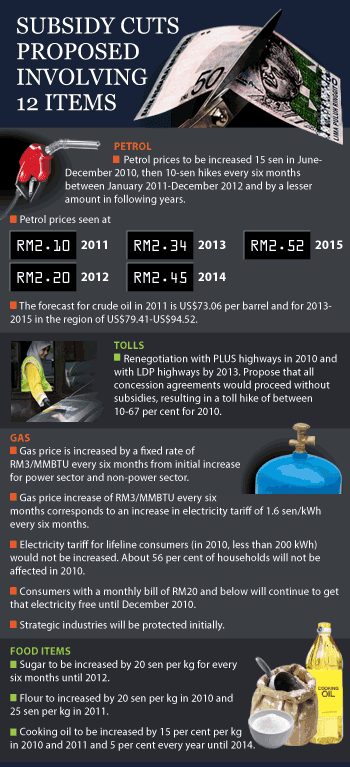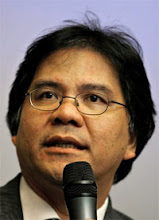1. What has been the biggest obstacle so far in implementing the Government Transformation Programme (GTP)? Jalina Hassan, Kuantan
The biggest challenge is to get the Government to achieve “big results fast”. When we ran the GTP Open Day, over 80% agreed that this was the right thing to do. However, the public was very sceptical. Someone cynically said: “Government civil servants and speed do not sleep in the same bed.” We realise that the rakyat is impatient for results but with the GTP Roadmap, we have clear direction and targets.
We have made significant progress in the first quarter of this year. Street crime has dropped 39.6% as compared to our initial target of 20% reduction by end 2010. We have mobilised 14,222 police officers into 50 hot spots and 3,150 RELA and JPAM members too.
For the urban public transport, we have seen an increase of 938,775 passengers for the light rail transit (LRT) in just three months after installing eight new four-car trains. For the hardcore poor, we have seen a massive reduction of more than 12,000 people in this country, which have been taken out from the hardcore poor category. These show that the civil servants can run and get things done quickly.
2. What are the common approaches that you’ve put in place in the Performance Management and Delivery Unit (Pemandu) that you also had in MAS or Shell? James Rajan, Ipoh
We introduced what the Government is now very familiar with, called Laboratories or labs. When I was in MAS, we ran over 200 labs to develop solutions.
The first GTP labs for the six National Key Result Areas (NKRAs) were conducted in Sept-Oct over six weeks and was made up of 250 top civil servants and representatives from the private and social sectors. During that period – and I’m sure what I’m about to say will surprise – the civil servants took on their tasks faster than the people in MAS and Shell. They were very eager and enthusiastic.
3. Has the recent crisis of confidence facing the police following the shooting of a 14-year-old boy had a serious dent in your transformation efforts? Kesavan Murthy, Penang
First and foremost, the nation is saddened by the death of Aminulrasyid Amzah in a most unfortunate incident. I personally would like to express my deepest sympathy to his family.
In the true spirit of transparency, an independent panel overseeing the investigation has been appointed and we should let the experts take their course of action instead of speculating. The Home Ministry and the police are still tasked to deliver their specific targets to the rakyat via the crime NKRA. There are early signs of positive achievements.
While statistics show significant progress in crime reduction, it would be naive to think that such an isolated incident has not affected public confidence and perception of the police force.
To me, despite this, the police have been doing a fantastic job. I really hope we, as concerned citizens, will not be easily lured into discussions on isolated cases that may alter our perceptions on the other positive things that the Government is doing.
4. What progress has been made so far? Kevin Loh, Penang
The GTP is delivering very visible and tangible outcomes. To fight corruption, we have put in place the Whistleblower Protection Act, published 2,665 government contract award winners at MyProcurement Portal, implemented the Integrity Pact (as recommended by Transparency International) and published the 97 convicted offenders on the Malaysian Anti-Corruption Commission’s website.
Ridership for bus express transit and LRT has increased by 13% and 7% respectively. In education, 929 pre-schools have started and 7,616 primary schools nationwide have been ranked.
The School Improvement Toolkit has also been implemented to address various weaknesses. The Government has also reduced the number of hardcore poor by providing them with financial aid.
Rural basic infrastructures are currently being developed and by 2012, we would have more than 7,000km of new and upgraded roads, 1,900km of which will be in Sabah and Sarawak.
There will also be 50,000 houses to be built and restored, 140,000 households will be connected with electricity and 360,000 homes to be connected to clean water.
Public transportation upgrades will decongest the central business district in Kuala Lumpur, reducing the time taken to travel into our city centres. More than 40,000 flood mitigation projects are already underway. These are just some of the key national initiatives underway.
5. Somehow, many assume that you are a Muslim. Any memorable encounters with regards to this ignorance? Rashidah Ibrahim, Petaling Jaya
Many years ago, my family and I lived in Subang Jaya. My neighbour, thinking I was a Muslim, invited me to a tahlil, on the occasion of sending their son for further studies in the UK.
As a friendly and respecting neighbour, I accepted the invitation and joined them. During the religious ceremony, many people at the event were shocked to discover that I was in fact, a Christian. It was a memorable experience as I thought the tahlil was quite similar to the tribal send-off we practise in the longhouses. During the Ramadan period, I usually get stares when I’m dining publicly. Apart from Christmas greeting cards, I also get Hari Raya cards.
6. What improvements would you like to see in our education system? Zuhairah Ali, KL
We must take big steps. Statistics show that 40% of students who enter primary 1 have not been to kindergarten. This means there is an evident disparity in the level of understanding as well as skill sets of children.
This is why our NKRA for education is working on the foundation to ensure a lot more young children attend pre-school. As of January this year, 18,000 children have benefitted from 929 new pre-schools. The education NKRA is also operationalising other initiatives such as the ranking of 7,616 primary schools and coming up with a toolkit known as School Improvement Programme (SIP). The SIP will anchor recommendations and action plans by the schools into four key levers – principals, teachers, students and facilities.
7. Your success in turning around big corporates is inspiring. I will be pursuing my tertiary education next year. What’s your advice on my course selection and future career path? Filzah Razak, Johor Baru
Simple – do something that you have a passion for and act on it. Always leverage on your strengths. Don’t get too obsessed with your weakness.
I have two children, Leon and Max and both have different strengths and capabilities. Leon followed his passion and chose to do film studies in London. I have never once considered dictating or painting an ideal future for him. He will be graduating this July and I am proud of him.
The point here is this – if you feel strongly about something, put your thoughts and actions together and strive for it. Do not get distracted or demoralised by views or opinions.
8. How are the objectives related to the key performance indicators (KPIs) communicated to the ground? As for underachievers, how do you address these “failures”? Tam Yeng Siang, Petaling Jaya
The performance and delivery of the six NKRAs and 29 Ministerial Key Result Areas are assessed annually and bi-annually.
So far, out of 29 ministries, 85% have achieved their KPI targets. This is the first time in the history of Malaysia that the ministers are subjected to the rigorous performance assessment by the Prime Minister. The Government will consider performance-based remuneration in the near future to recognise and award the performers.
Consequence management will be in place to tackle poor performers. To ensure the transformation programme is sustainable, you do not focus on punishment as a starting point. You focus on rewarding the performers, and the rest will follow. As for the public, we will publish an annual report each year that will highlight the results of the GTP – what we have and have not achieved.
9. What kind of legacy do you want to leave and what inspires you to do better in life? V. Suresh, Johor Baru
Although the main focus is to get the desired results, I am also inspired to see people grow as leaders in the process. Honestly, that is what truly inspires and energises me.
I like to share this famous quote by John Ruskins – “The greatest reward from a man’s toil is not what he gets from it, but what he becomes of it.”
The transformation will give birth to new leaders from the civil service who have surfaced from the labs. When you allow for a safe environment where people can discuss and debate openly, you will discover hidden talents and potential leaders. When you know that your troops are fully matured as a leader and know how to operate or run the company, it’s time to go. This is where you transit from taking a very directive leadership stance to an empowering approach.
10. How different is it to work in the Government compared with the private sector? Johan Abdullah, KL
I have worked for 28 years in the corporate world. Now, for the first time, I don’t need to improve the profit and loss (P&L) of a company or department. In MAS and Shell, I was accountable to improve bottomline, hence I religiously reviewed the P&L statement every day.
In the Government, you focus on services or initiatives to improve the outcome for the rakyat. KPI for the government is to benefit the rakyat. The same transformation methodology is applied but the anchor are the outcomes and KPI.
There are obvious differences in the culture. At Shell, we speak our minds. Having been in that environment for 23 years and moving to MAS for three years and eight months was an adjustment. But the MAS experience was invaluable to me especially in this job. We have to learn to be tactful in our approach while not compromising our integrity.
In Shell and MAS, we know precisely our customer and target customer segments. In the government, although we look after the rakyat, we sometimes struggle to answer this one question – “Who is the rakyat?”. There are a lot of polarities that exists which we need to manage – rich vs poor, urban vs rural, educated vs less educated, old vs young, etc.
What we found at times is that the majority of the rakyat is also the silent majority. We can also be easily distracted by isolated issues by minority groups. So, it is not always clear cut.
Source: TheStar
Do you have any questions you'd like to ask him? Put it down here as comments.
 Datuk Seri Idris Jala signing a plaque to mark the launch of Schlumberger’s financial hub. With him is Simon Ayat.
Datuk Seri Idris Jala signing a plaque to mark the launch of Schlumberger’s financial hub. With him is Simon Ayat.
 The minister in the Prime Minister’s Department in charge of the Government Transformation Programme (GTP) expressed confidence that Vision 2020 would be achieved because of the Economic Transformation Programme (ETP).
The minister in the Prime Minister’s Department in charge of the Government Transformation Programme (GTP) expressed confidence that Vision 2020 would be achieved because of the Economic Transformation Programme (ETP).



